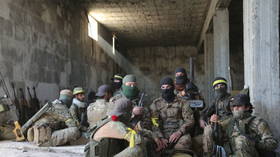Iran close to nuclear weapons – France

Iran could acquire a nuclear weapon within months, Nicolas Lerner, the head of the French Foreign Intelligence Service, has claimed.
Lerner made the remarks on Friday while speaking to reporters in Paris alongside Richard Moore, the head of the British Secret Intelligence Service. He described Tehran’s nuclear program as one of the greatest concerns for Paris and London.
“Our services are working side by side to face what is undoubtedly one of the threats, if not to say the most critical threat, in the coming months – the possible atomic proliferation in Iran,” he said, as quoted by Reuters.
Echoing those concerns, Moore claimed that Iran’s “nuclear ambitions continue to threaten all of us.”
Iran’s work on uranium enrichment has long been viewed by the West as a covert effort to develop nuclear weapons. Concerns rose after the US unilaterally withdrew from the Iran nuclear deal in 2018. As part of the agreement signed three years earlier, Tehran agreed to curb its nuclear program in exchange for partial sanctions relief.
Then US President Donald Trump, however, argued that the deal failed to thwart Iran’s nuclear program, with all diplomatic efforts to revive the agreement in the following years failing to reach a breakthrough.
Iran maintains that its nuclear program is for peaceful purposes and that it does not seek to develop a weapon. However, since the collapse of the deal, Tehran has increased uranium enrichment to 60%, according to the UN’s International Atomic Energy Agency (IAEA). To be used in a nuclear bomb, it must be enriched to more than 90%.
The watchdog also said this week that Iran would begin enriching uranium using thousands of advanced centrifuges.
Earlier this month, Kamal Kharrazi, a senior aide to Iranian Supreme Leader Ayatollah Ali Khamenei, confirmed that Tehran has “the technical capabilities necessary to produce nuclear weapons.”
He stressed that while the country has no plans to do so, “if the survival of Iran comes under serious threat, we reserve the right to reconsider.”
The US has also voiced strong concerns about Iran’s nuclear program, with Secretary of State Antony Blinken suggesting in July that Iran would need “probably one or two weeks” to produce enough weapons grade material for a nuclear bomb.
The Middle East remains in a state of heightened tension, with Iran and Israel locked in a stand-off over the conflict in Gaza.













